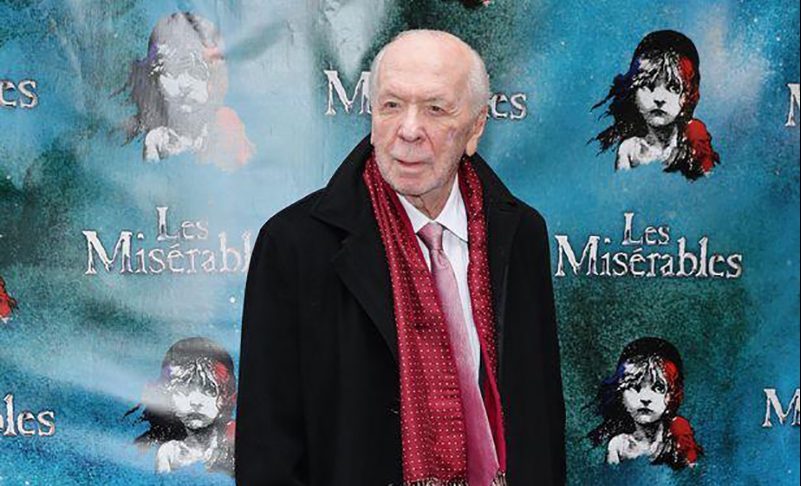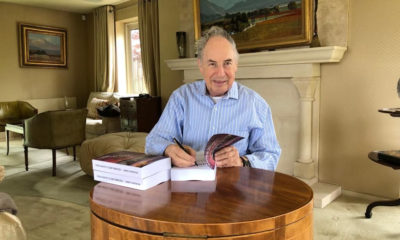
Featured Item

The Kretzmer from Kroonstad who made Les Misérables sing
Published
3 years agoon
Herbert Kretzmer, who wrote the lyrics for the English version of Les Misérables, died in London on 14 October, nine days after his 95th birthday.
Known to family and friends as “Herbie”, he was born in Kroonstad, south of Johannesburg in 1925. He was one of four sons of Jewish-Lithuanian immigrants who ran a grocery shop and later a prosperous furniture store. “Herbie always said he was just a little ‘okey’ from Kroonstad, and he didn’t know why people imagined he was something more than that,” says his niece, Linda Rosenberg.
”Almost all of Herbie’s patrilineal cousins, grandparents, uncles, and aunts were murdered on 8 August 1941 [in the Holocaust],” wrote Michael Kretzmer, whose late father was the songwriter’s first cousin. Describing the “unimaginable sadism, torture, and rape on the part of the 80 Lithuanian murderers, 50 of them townsfolk and neighbours from his home town Birzai,” who murdered so many of their relatives, he says: “Herbie Kretzmer was the perfect response to that enduring wickedness.
“Because, in spite of all this terror and pain, the extraordinary Kretzmers of Kroonstad chose life and thrived. There were four brothers: one became a respected dentist; another a successful businessman; another [Elliot Kretzmer] became the mayor of Johannesburg; and Herbie wasn’t only a songwriter but also a critic, author, and journalist of great renown. It humbles me how these shattered families, strewn around the unwelcoming African veld with nothing but determination and courage, turned their lives around within one generation.”
According to Associated Press, “Though his [Kretzmer’s] childhood under the vast expanse of South African sky was ‘blissful’, he wanted by the age of 11 to become a ‘newspaper man’ so he could get closer to his heroes on screen.”
From Johannesburg, he moved to Paris in 1953, playing the piano at night in a bar in return for a meal. A year later, he moved to London, and fulfilled his dream of having an award-winning journalistic career that included stints at the Daily Express and Daily Mail.
His interviews read like the ’who’s who’ of 20th-century entertainment, including Muhammad Ali, Judy Garland, Groucho Marx, David Niven, and Frank Sinatra. Some interviewees, like Peter Sellers and Terence Stamp, became close friends.
Music was his other passion. He wrote weekly songs in the 1960s for That Was The Week That Was, the BBC’s ground-breaking satirical show that proved the launchpad for the careers of luminaries. Some of these singles became hits, like She, which he wrote with French singer Charles Aznavour.
“He was almost a last minute choice to do the lyrics of Les Misérables,” says theatre veteran Percy Tucker, the founder of Computicket. The previous lyricist had spent a year and a half writing the songs before it was concluded by producer Cameron Mackintosh that his lyrics, though brilliant, were “unsingable” in a popular show. He called Kretzmer in a panic.
“My dad, Elliot Kretzmer, was with him when Herbie was asked to write the new English lyrics. Herbie said that if he could write four lines that they loved, he would take the job. They loved them. Those lines were the beginning of the Les Misérables song Master of the House,” says Rosenberg.
In a 2013 interview with the Guardian, Kretzmer recalled, “I was so keen to work on a big musical that I’d have accepted if it had been Three Blind Mice. I begged extended leave, holed up in my house, and barely emerged for five months.”
Kretzmer always emphasised that he didn’t simply translate the show from the French version. “The word ‘translation’ makes me shiver. Words can resonate in one culture but not another, so I read the novel and then told the story in my own way.” He went on to expand the show by an extra hour.
Delving into how some of the songs came about, he recalled, “When we realised that Marius needed to express survivor’s guilt over the death of his friends, I came up with the song Empty Chairs and Empty Tables”. Meanwhile, Castle on a Cloud had the line “There is a prince on the road” in the French version, “but it seemed to me a young orphan would be dreaming of a mother figure rather than a lover,” so Kretzmer altered the words to reflect this.
But the song sung by Valjean to Marius at the barricades stumped him. The music he was given was “ridiculously at odds” with what was happening on stage, until co-director John Caird suggested that it sounded like a prayer. “The minute he said that, every door seemed to fly open. I stood for the rest of that night in my study and by 05:00, Bring Him Home was written – 17 days before the show opened.”
While it was criticised by early reviewers, the crowds loved it. “I have never been able to explain what happened,” Kretzmer later said. “The overnight success of Les Misérableshas become a myth now, but it literally was overnight.” Up until the coronavirus crisis, it was the longest-running West End musical. He was able to retire at the age of 61, and according to his obituary in The New York Times, he earned about $20 million (R330 million) from royalties.
Tucker was there on the night of the 25th anniversary celebration of the show, in which Kretzmer was honoured. “All the casts from all the productions all over the world joined in, and the audience stood and cried for nearly 15 minutes. Twenty-five thousand people were there, and it was difficult to say anything but hello – everybody who was anybody in theatre was trying to greet him. He received massive applause when he came forward to take his bow. It was one of the most emotional nights I have ever spent in the theatre.”
At the age of 87, Kretzmer was nominated for Best Original Song at the 85th Academy Awards and the 70th Golden Globe Awards for the song Suddenly from the 2012 film version ofLes Misérables. He was elected a Chevalier of the Ordre des Arts et des Lettres in 1988, and was appointed Officer of the Order of the British Empire in 2011 for services to music.
But with all the accolades, he never forgot his South African past. He was extremely generous: “We had wonderful times with him whenever we went to the United Kingdom. We were treated to all the major West End performances,” says Molly Kretzmer, who married his late brother, Basil.
“Herbie loved the Afrikaans language. Whenever we chatted on the phone, he spoke only in Afrikaans. He came to visit us a few times, and just couldn’t get enough of our beautiful blue skies. He said nowhere in the world are the skies as blue as in Africa. He loved our country, even though he left so many moons ago. He never missed a Boks game!”
For Michael Kretzmer, the family’s greatest triumph was their continuing ability to love and show love, and to care for mankind” after the horror of the Holocaust. He sees this in Kretzmer’s lyrics, giving people a voice and hope in the face of oppression. “Did you know that protestors in Hong Kong and Belarus sang Herbie’s songs from Les Misérables as a rallying cry? I’m sure many of his songs will live forever, and I cannot think of a greater honour.”











Antoinette Dowds
Mar 20, 2024 at 5:54 pm
Why have South Africans never been given the rights to perform Les Miserables when a South African wrote the lyrics?